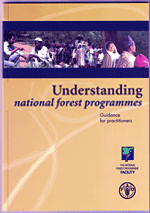
| Publications |
||||
How can national forest programmes support countries’ aspirations for democratization and decentralization? How can they link up with existing national strategies such as poverty reduction? And how can regional processes contribute to endorsing the further development of this political instrument? In celebration of the fifth anniversary of the FAO’s National Forest programme Facility the FAO journal Unasylva has devoted its 3/06 issue to such questions, with the leading article by ECO Managing Director Cornelia Sepp. |
|
|||
|
Cornelia Sepp, who just comes from authoring the FAO manual “Understanding national forest programmes” (above, right), recalls in her Unasylva article the essentials of the concept of national forest programmes, as a basis for establishing consistent long-term forest and forest-related policies in a country. Their adaptive, negotiable and dynamic character as a process, sets nfps qualitatively apart from any previous planning frameworks such as the Tropical Forestry Action Programme, National Forestry Action Plans and their kind. Experience tells that addressing forest issues through an nfp offers possibilities to reach a wider scope of stakeholders, mobilize new service providers and create more and lasting attention to forest sector matters and to the difference they make on poverty reduction. In the last ten years, practical application of nfps has been facilitated by three important moves: the FAO’s publication, as early as in 1996, of “nfp priciples” derived from the International Panel on Forest’s negotiations, as a set of minimum standards to guide an nfp process. |
|
As the “Principles” went into print, these standards were in the course of being moulded into the Proposals for Action – a document of rather scattered, often repetitive negotiated text. In 2004, an Australian compilation made a great move forward in clustering certain thematic thrusts from the IPF (and subsequent IFF) Proposals, thereby making them much more transparent for practitioners.*) Cornelia Sepp, in her 2006 FAO manual (together with Eduardo Mansur) goes even further in distilling the key recurring prerequisites and recommendations into three umbrella principles in which all other nfp elements are embraced: Sovereignity (and country leadership), consistency (within and beyond the forest sector) and partnership (and participation). According to Sepp, respecting these three principles (that are further elaborated on in the manual), observing a logical sequence of action-learning cycles (four phases with flexible entry points) and trying to reach a defined set of related outputs has great chances of making an nfp a success – genuine commitment and long-term endorsement from governments and donors provided. |
||
| Our field of work: Good governance | Our services: Policy and strategy advice | Author |




